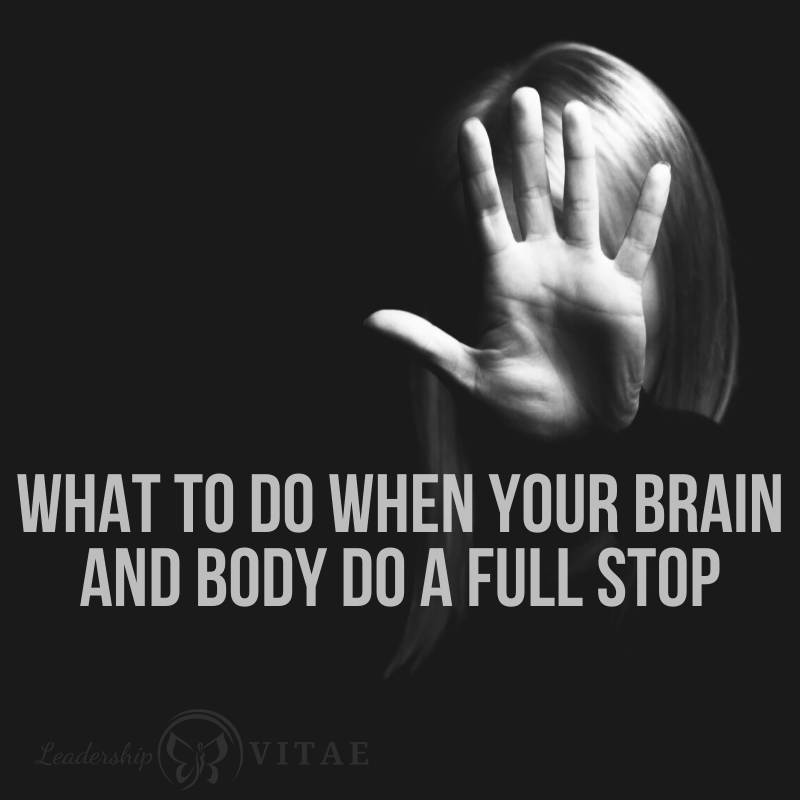
Overload. Burnout. Exhaustion. Overwhelm.
There are a myriad of terms, but they all describe that place we go when our brains and bodies have had enough. We shut down.
In the last few months, many of us have had to manage our way through previously unimaginable levels of change and stress. Whether you are a student of Myers-Briggs (MBTI) and recognize it as the grip, or the NeuroLeadership Institute (NLI) notion of threat state, we are all there.
“There” is a place where we are sustaining high levels of stress and strain. There is no aspect of our lives that is immune. Our health, finances, career, family, community…we are experiencing challenges on all fronts.
Full stop
Our brains and bodies can only take so much trauma before they shut down. Before we must recoup and recover. Come to a full stop to conserve our energy.
This may look different, depending on how each of us is trying to get through the day. Most of us cannot afford to lie down for a week-long nap, or even a few hours. Instead, we may find ourselves slowing down, becoming mentally sluggish, and/or feeling like we are still exhausted when we wake up in the mornings.
I didn’t recognize that I was going through more pronounced stress than normal. Until my son left for 6 weeks.
During the work week, I was able to use my schedule as a way to ignore what was happening. It wasn’t until the first weekend alone, when I found myself sitting on the couch all day with no energy and motivation, that I first realized there might be something going on.
I finally found myself in a place where that was happening every evening after work. Feeling down and struggling to find a way out. I recognized what was happening, but was unsure what to do about it.
Coping
When we are in a place of prolonged heightened stress, and are searching for ways to manage or get through it, we turn to coping mechanisms.
We all have them, and they vary by person and situation. What works in one situation for one person, may not work for another person in the same situation. They are the methods we each create to get us through…habits that we’ve found make us feel more in control, comforted, grounded, etc.
Our methods can be healthy or unhealthy. Even healthy methods can be unhealthy when taken to extremes. Retail therapy can be great, until we have massive credit card debt. Exercise is very healthy, unless we become too obsessive and aren’t fueling our body enough.
Over the last few months, I realized how dependent I was on retail therapy and have sought out alternatives. Instead, I focused on writing, exercising, eating healthier, and connecting with my support network.
When I started struggling a few weeks ago and went into shut down, that all stopped. I wasn’t doing anything on my healthy coping list. I avoided my friends, became inactive, and was intentionally trying to exhaust myself so I could quiet my brain at night.
The rational part of me was fully aware I was making poor decisions. But I was not behaving rationally. I was in an unhealthy place and making unhealthy choices that would keep me there unless I could discover a way out.
Reenergizing
Healthy coping mechanisms can help create the space necessary for us to reenergize and get back to a manageable stress level. Or minimally help balance the stress we are all carrying each day in the current environment.
Sometimes, we are not taught and/or have not developed those healthy coping mechanisms. Or they can’t keep up with the challenges we are facing. Sometimes, such as in my case, we feel unable to find the energy for healthier choices.
I was fortunate. My friends knew my son was gone and kept checking in with me. I was avoiding them because I knew everyone was struggling and I didn’t want to be a burden. A good friend reminded me that I rarely create opportunities for her to give back in our relationship, and that the ability to help me was helping her.
That first step gave me the energy to take another. And then another. I’m still struggling, but making progress. Having a good day, and then two. I’m not working out as often as I’d like, but I’m walking and writing. Maybe I’ll cut back on the snacks soon too.
There are times when we might find it difficult to help ourselves. Coping mechanisms fail and/or are unhealthy, and our ability to reenergize and recover seems unattainable. Where do we turn?
Finding Support
Human connection is one of the best ways to help us manage our way through stress and strain. To help us come back from that full stop, find healthy ways to cope, and ultimately find our equilibrium.
That connection could be through friends or family. Maybe it’s facebook or meetup groups, clubs, or community organizations. It doesn’t matter what form the connection takes, but that we have a place where we are understood and feel a sense of belonging.
Unfortunately, in the current environment, some of our support networks may not be available to us or have changed venues. Maybe they have gone virtual or ceased all together. In some cases, we may feel isolated from those that used to provide comfort.
I’ve been considering telehealth over the last week. Someone to talk through what I’ve been experiencing and help me navigate. To find new coping mechanisms or think of ways to push me back towards ones that worked for me before.
Telehealth may be an option if you:
- Find yourself feeling overwhelmed
- Have low energy and motivation
- Are relying on unhealthy coping mechanisms
- Don’t have a support network to talk through what you’re experiencing
Our mental health is as critical as our physical health to our overall well-being. If our bodies suffered prolonged exposure to a toxin, we would expect to invest in physical recovery. Mental care and recovery during prolonged exposure to stress is just as important.
This is an unprecedented time with no guidebook on how to navigate it. We are all doing the best we can, but sometimes we might need some support to help us through the day or week.
Regardless of our challenge, we can all benefit from occasional help. In this collective challenge, where we are all experiencing excessive stress on multiple fronts, it would be a surprise if we didn’t. I’d encourage us all to have grace with ourselves, and reach out to others to extend that same grace and maybe an ear.
* * *
If you find yourself struggling and need someone to talk to, Lifeline is available at 800-273-8255. They can be an ear to discuss your thoughts and feelings during this turbulent time.
If you do not feel safe in your home and cannot talk on the phone, you can text LOVEIS to 866-331-9474. The text will put you in contact with an advocate to connect confidentially.








